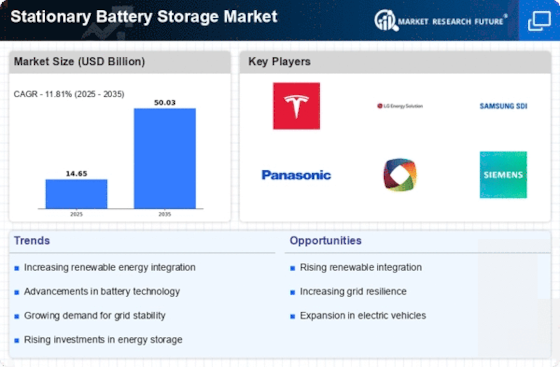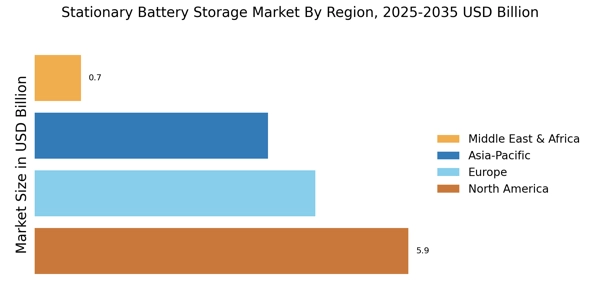The Stationary Battery Storage Market is currently characterized by a dynamic competitive landscape, driven by the increasing demand for renewable energy integration and grid stability. Major players such as Tesla (US), LG Energy Solution (KR), and BYD (CN) are at the forefront, each adopting distinct strategies to enhance their market positioning. Tesla (US) continues to innovate with its energy storage solutions, focusing on scalability and efficiency, while LG Energy Solution (KR) emphasizes partnerships with utility companies to expand its footprint in the global market. BYD (CN), on the other hand, is leveraging its extensive manufacturing capabilities to offer cost-effective solutions, thereby appealing to a broader customer base. Collectively, these strategies contribute to a competitive environment that is increasingly focused on technological advancement and strategic collaborations.
In terms of business tactics, companies are localizing manufacturing to reduce costs and enhance supply chain resilience. This approach is particularly evident in the context of geopolitical tensions and supply chain disruptions. The market structure appears moderately fragmented, with several key players holding substantial market shares, yet numerous smaller firms also contributing to innovation and competition. The collective influence of these major players shapes market dynamics, as they engage in both competitive and cooperative strategies to navigate the evolving landscape.
In September 2025, Tesla (US) announced the expansion of its Gigafactory in Nevada, aimed at increasing production capacity for its energy storage products. This strategic move is likely to enhance Tesla's ability to meet the growing demand for stationary battery systems, particularly in the residential and commercial sectors. By scaling up production, Tesla not only solidifies its market leadership but also positions itself to respond more effectively to fluctuations in demand.
In August 2025, LG Energy Solution (KR) entered into a partnership with a leading European utility provider to develop large-scale energy storage projects. This collaboration is indicative of LG's strategy to strengthen its presence in the European market, which is witnessing a surge in renewable energy adoption. The partnership is expected to facilitate the deployment of advanced battery technologies, thereby enhancing grid reliability and supporting the transition to a low-carbon economy.
In July 2025, BYD (CN) launched a new line of stationary battery systems designed specifically for commercial applications. This product line aims to address the unique energy storage needs of businesses, particularly in sectors with high energy consumption. By diversifying its product offerings, BYD is likely to capture a larger share of the commercial market, further solidifying its competitive position.
As of October 2025, the Stationary Battery Storage Market is witnessing trends that emphasize digitalization, sustainability, and the integration of artificial intelligence in energy management systems. Strategic alliances are increasingly shaping the competitive landscape, as companies recognize the value of collaboration in driving innovation. Looking ahead, competitive differentiation is expected to evolve, with a shift from price-based competition to a focus on technological innovation, reliability of supply chains, and the ability to deliver sustainable solutions. This transition underscores the importance of adaptability and forward-thinking strategies in maintaining a competitive edge.


















